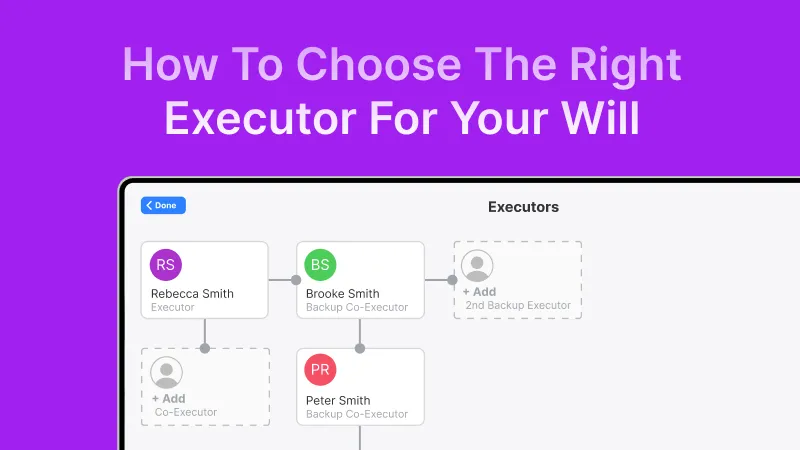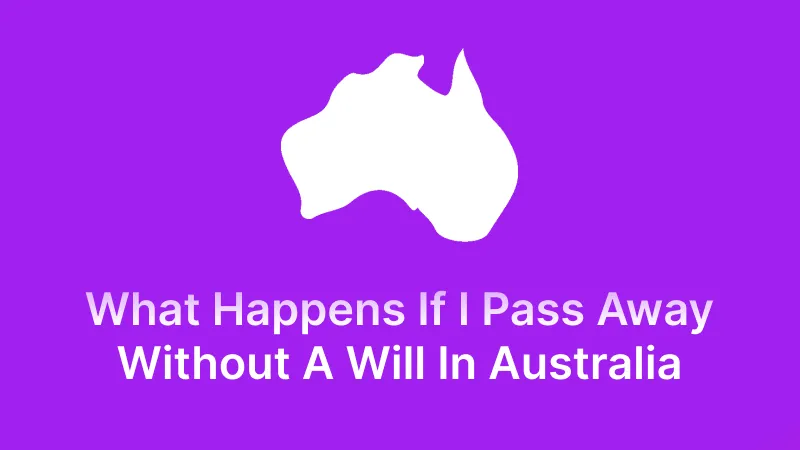- Estate Planning
- Superannuation
What Happens To Your Superannuation When You Die?
Understanding what happens to your superannuation when you die is crucial for proper estate planning. Learn about death benefits, beneficiaries, and how to ensure your super goes to the right people.
Quick answer: Superannuation sits outside your Will
Superannuation is one of the most significant assets many Australians hold — yet it's often overlooked in estate planning. Unlike the assets in your Will, your super doesn't automatically form part of your estate when you pass away. Instead, it is held in trust and must be paid out by your super fund's trustee to either your dependants or your estate.
Who Can Receive Your Super When You Die?

When a person with superannuation passes away, their fund pays out what’s called a superannuation death benefit. This generally includes the balance of their super account and any life insurance held within the fund.
The trustee must pay the benefit to:
- A dependant under superannuation law, or
- The legal personal representative (LPR) of the estate (if directed by a valid nomination or at the trustee’s discretion).
Eligible dependants include:
- A spouse or de facto partner (same or opposite sex)
- Children of any age
- Someone in an interdependency relationship with you
- Someone financially dependent on you at the time of death
Important: You can’t leave your super to a friend, sibling, or other relative unless they fall into one of the above categories.
You Can Nominate Who Gets Your Super
Most super funds allow you to nominate who you’d like your super to go to when you die. This can be done in two ways:
1. Binding Death Benefit Nomination
- This legally binds the trustee to follow your instructions—so long as the nomination is valid and current.
- It must generally be renewed every three years unless it’s a non-lapsing nomination, which some funds allow.
- To be valid, it must be:
- In writing
- Signed and dated
- Witnessed by two adults who are not beneficiaries
2. Non-Binding Nomination
- This tells the trustee your preference but doesn’t bind them to follow it.
- The trustee will take your nomination into account, but they can distribute your super differently based on the circumstances and their discretion.
Revisionary Pension Nomination:
If you’re already drawing a pension from your super (e.g., an account-based pension), you may be able to nominate a reversionary beneficiary. If accepted, the pension will automatically continue to that person — typically your spouse or a dependent child.
IMPORTANT TIP: Review your nomination every 3 years or after major life events (marriage, divorce, children).
Who Exactly Can You Nominate?
You can only nominate someone who meets the definition of a superannuation dependant under Australian law. This includes:
- Your spouse or de facto partner (including same-sex)
- Your children of any age (including adopted or step-children)
- Someone you are in an interdependency relationship with
- Your legal personal representative (i.e. your estate, which will be handled according to your Will)
If you nominate someone who doesn’t meet these criteria, your nomination may be invalid or ignored.
What If You Don’t Make a Nomination?
If you haven’t nominated anyone (or your nomination is invalid or expired), the fund’s trustee will decide who receives your super. They will generally follow your fund’s policy, prioritising eligible dependants, or otherwise paying it to your estate.
This can lead to delays or unintended outcomes — so it’s important to ensure your nomination is current and valid.
In short: if you don’t choose, someone else will.
Does Your Will Control Your Super?
Super doesn’t automatically go into your Will.
Your Will only controls your super if:
- You nominate your legal personal representative (your estate) as the beneficiary
- The super fund pays your benefit to your estate
Once in your estate, your Will then dictates how it’s distributed.
How to Make Your Will Legally Valid in Australia
Are Super Death Benefits Taxable?
Whether your loved ones pay tax on your super when you die depends on who receives it and how it’s paid.
Tax-Free:
- Spouse or de facto partner
- Children under 18
- Financial dependants
- Someone in an interdependency relationship with you
Tax Applies:
If your benefit goes to a non-tax dependant (e.g. an independent adult child, or someone who is not a tax dependant under ATO rules), they may pay tax on the taxable component:
- 15% on the taxable component, plus Medicare levy (often around 17% in total)
- In some cases, total tax for non-dependants can be up to 32% (including Medicare levy and applicable surcharges)
Rates and components change; check the ATO’s superannuation death benefits page for current figures. Whether paid as a lump sum or income stream also affects tax.
New in 2025: Division 296 “Death Tax”
From 1 July 2025, if your total super balance exceeds $3 million, a new 30% tax (Division 296) applies to earnings on the excess amount. This can affect how much is left to your beneficiaries — especially if they are non-dependants.
Now more than ever, it’s worth reviewing your super and speaking to a financial adviser.
Income stream or lump sum?
When you die, your super doesn’t just have to be paid out as a lump sum. If the beneficiary is a tax dependant, they may have the option to receive your super as an income stream, also known as a reversionary pension.
This is particularly useful for:
- Spouses or partners who want regular income instead of a one-off payment
- Tax planning, as income streams may be taxed more favourably in retirement
Your fund may allow you to nominate a reversionary beneficiary when you start a pension account. This ensures your income stream continues to them automatically upon your death.
How Long Does It Take to Receive Super After Death?
Super funds must pay death benefits as soon as practicable once they’ve been notified of the death and received the required documentation. Delays can occur if:
- The nomination is unclear or expired
- There are disputes among potential beneficiaries
- The trustee needs to investigate the relationships or financial dependence
Typical timeframes: 4–8 weeks after all documents are received. Delays are common if beneficiaries are unclear or disputed.
Should You Nominate Your Estate as Beneficiary?
You might do this if:
- You want your Will to control who gets your super
- You’re using testamentary trusts
- You want to simplify asset distribution
But be careful: this route may trigger probate delays and tax implications for some beneficiaries.
What about self-managed super funds (SMSFs)?
If you have a Self-Managed Super Fund, it’s even more important to have a valid and up-to-date binding death benefit nomination—or better yet, a specific clause in your SMSF trust deed.
There have been several court cases where family members disputed SMSF decisions due to:
- Missing or expired nominations
- Inconsistent wording in the trust deed
- Lack of clarity about who had control of the fund after death
SMSF rules are stricter and more prone to challenge. Always seek legal advice when handling nominations within an SMSF.
How to Make Sure Your Super Goes Where You Want
Here’s a simple checklist:
- ✅ Check who your super fund is
- ✅ Log into your account and see if you’ve made a beneficiary nomination
- ✅ Make or update a binding nomination — especially if your situation has changed
- ✅ If nominating your estate, make sure your Will is valid and up to date
- ✅ Tell your executor or loved ones what you’ve done and where to find documents
For how super fits into your overall estate plan, see Australia’s great wealth transfer. For your Will, naming backup beneficiaries ensures your estate still goes where you want if a beneficiary can’t receive.
When should you update your nomination?
You should review or update your super nomination when:
- You get married or divorced
- You enter or end a de facto relationship
- You have children (or stepchildren)
- Someone you’ve nominated dies
- You start an income stream (reversionary pension)
- Your super fund changes its rules
Even a valid nomination may become outdated if your life circumstances change.
Helpful Links: How to Nominate a Super Beneficiary
Here’s where to manage nominations for some major Australian funds:
- AustralianSuper Death Benefit Guide
- Hostplus Beneficiaries Page
- REST Super Beneficiary Info
- HESTA Nominate Beneficiary
- UniSuper Binding Nomination Info
Don’t wait until its too late – updating your nomination takes just a few minutes.
Frequently Asked Questions (FAQs)
Can I leave my superannuation in my Will?
Only if you nominate your estate as the beneficiary. Otherwise, your super fund decides who gets it.
Does a binding nomination expire?
Yes, usually every 3 years unless your fund offers a “non-lapsing” option.
Can I leave my super to my adult children?
Yes, but it may be taxable if they are not financial dependants.
What if I have multiple super funds?
You must nominate beneficiaries with each fund. There is no central registry.
Final Thoughts
Superannuation is often one of your most valuable assets — but it sits outside your Will unless you plan for it.
By making the right nomination and ensuring your Will is up to date, you’ll make things much easier for your loved ones when it matters most.
At Will Hero, we help Australians take control of their estate planning — and while we don’t manage your super, we make sure your Will is valid, accessible, and kept up to date.
About Will Hero
Will Hero is an Australian online Will platform that provides state-specific Will templates designed around Australian succession law. Documents are created using guided software and reviewed against jurisdiction requirements used across the platform. Thousands of Australians have used Will Hero to prepare their Will online.
Will Hero provides general legal information and document preparation tools and is not a law firm or a provider of personalised legal advice. The platform is intended for use by Australian residents making a Will under Australian state law.








